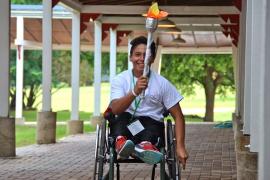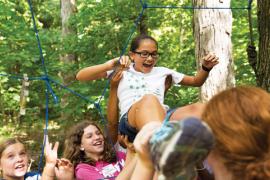Imagine a camping experience where individuals of all abilities can connect with the beauty of nature.
The demand for facilities that are compliant with the Americans with Disabilities Act (ADA) has been on the rise, which reflects a growing need for inclusive outdoor recreation. Meeting ADA standards is not just about legal compliance but also is an ethical responsibility. By providing accessible facilities, camps demonstrate their dedication to fostering an inclusive environment where individuals of all abilities can engage in camping and outdoor activities. Camps that prioritize ADA-compliant units also contribute to a positive industry reputation. This attracts a diverse camper base and positions the camp industry as a leader in accessibility.
The Importance of ADA-Compliant Units at Camp
ADA-compliant units that conform to the requirements of the Americans with Disabilities Act play a pivotal role in ensuring accessibility for people with disabilities. In the camp industry, ADA-compliant units serve as a hallmark of superior business practices. These units convey a clear message that the camp is not just a place for recreation but is inclusive, welcoming, and sensitive to the needs of all individuals. This commitment to inclusivity can bolster a camp’s reputation, attract a broader clientele, and foster a more diverse and enriching community.
When constructing ADA-compliant camps, several elements should be considered:
- Path of travel: Ensure a clear and unobstructed path of travel connecting all areas of the camp, including cabins, dining hall, restrooms, and other facilities. This includes accessible parking spaces, ramps or lifts for elevation changes, and wide doorways.
- Recreational areas: Make all recreational areas, such as swimming pools and sports fields, accessible with entrances and pathways. Provide alternative options if the activities themselves are not accessible to individuals with disabilities.
- Cabin design: Design cabins with accessibility in mind by incorporating features such as wider doorways, lowered shelves and counters, and grab bars in bathrooms.
By incorporating these elements, camps can ensure that all individuals, regardless of their abilities, can fully participate in all activities and amenities.
ADA-Compliant Cabins
What are the attributes of ADA-compliant cabins?
- Accessible living spaces: Designing cabins with wheelchair ramps, wider doorways, lowered thresholds, and spacious interiors to accommodate mobility devices ensures that campers can navigate living spaces comfortably.
- Adaptive bathrooms and kitchens: ADA-compliant bathrooms featuring transfer showers, grab bars, and wheelchair-friendly layouts enhance accessibility. Similarly, kitchens with front-controlled appliances and user-friendly designs cater to a diverse range of campers.
- Innovative storage solutions: Consideration of unique storage needs, such as raised water heaters for easy access, demonstrates a commitment to accommodating guests with specific requirements.
To ensure accessible recreational experiences, camp leadership can take several proactive steps:
- Understand industry standards: Familiarize camp employees with ADA standards for outdoor facilities. Provide training to ensure staff members are well-versed in creating an inclusive environment.
- Conduct regular accessibility audits: Conduct regular audits of camp facilities to identify areas for improvement in accessibility. Implement necessary changes to enhance the overall inclusivity of the camp.
- Collaborate with accessibility experts: Seek guidance from accessibility experts, including structure manufacturers, to ensure camp facilities meet or exceed ADA requirements.
Challenges Faced by Camps
Despite the significant benefits of ADA-compliant units at camp, camp owners still face challenges implementing them. The most common challenge is the cost associated with constructing or upgrading existing structures to meet ADA requirements. This can be a significant financial burden for smaller camps or nonprofit organizations.
Another challenge is the lack of knowledge and understanding about ADA requirements among camp owners and staff. This can lead to mistakes in design or construction that result in cabins and other living spaces that are not fully compliant.
To address these challenges, camps can explore resources and support from organizations specializing in ADA compliance for recreational facilities and seek guidance from other camps with successful ADA-compliant implementations.
In addition, an article from the ADA National Network (2024) highlights federal tax incentives for businesses making alterations to improve accessibility. The Disabled Access Credit (Internal Revenue Code, Section 44) provides assistance to small businesses, defined as those with revenues of $1 million or less or 30 or fewer full-time workers in the previous tax year. This credit covers eligible access expenditures, such as removing barriers, providing interpreters, making audio and visual materials accessible, and acquiring or modifying equipment for individuals with disabilities. The credit is 50 percent of eligible access expenditures, up to a maximum of $10,250, with no credit for the first $250, resulting in a maximum tax credit of $5,000. Additionally, businesses of any size can take a tax deduction under Internal Revenue Code – Section 190 for the costs of removing architectural or transportation barriers, along with a business expense deduction of up to $15,000 per year for barrier removal. Loans and grants are also available to small businesses.
There are many opportunities to remove barriers to campground owners and barriers to campers so that everyone benefits.
Vacavia Cottages & Cabins is a manufacturer of park model homes, tiny homes, and modular homes located in Ochlocknee, Georgia, and ships products throughout the Continental United States. Vacavia Cottages & Cabins specializes in providing temporary and recreational housing solutions, including ADA-compliant units, for campgrounds, RV parks and resorts, hunting and fishing camps, overnight camps, and other unique outdoor venues. For more information, visit their website at vacavia.com, or contact them at 1-866-574-5159 or via email at [email protected].
Gina Tabasso holds a Lean Six Sigma Green Belt and is working on her Black Belt project. She has done B2B marketing strategy and implementation primarily in the manufacturing, industrial, distribution, and trade space for 30 years and owns Barracuda B2B Marketing. Gina was recently the director of marketing and business development for Vacavia Cottages & Cabins.
Reference
- ADA National Network. (2024). What funding assistance is available for removing barriers and accommodating customers with disabilities? adata.org/faq/what-funding-assistance-available-removing-barriers-and-accommodating-customers-disabilities


